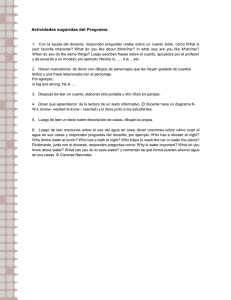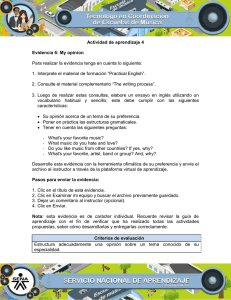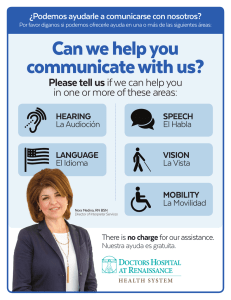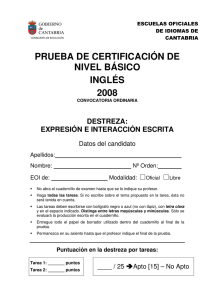Talking to Your Child about Bullying Open Communication
Anuncio
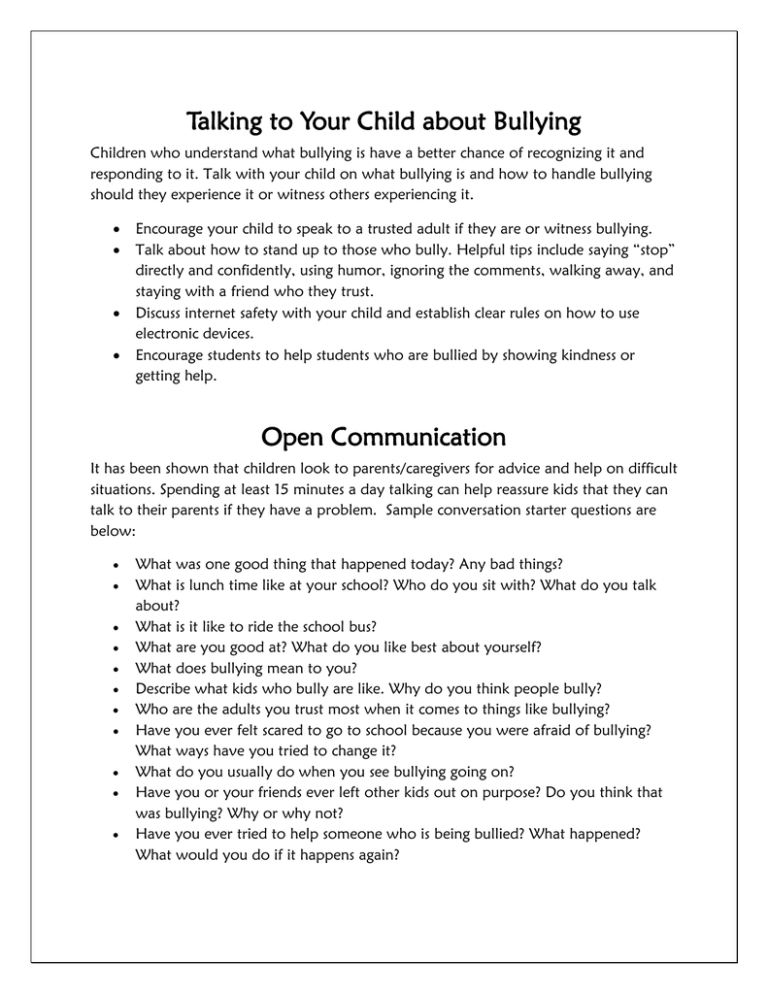
Talking to Your Child about Bullying Children who understand what bullying is have a better chance of recognizing it and responding to it. Talk with your child on what bullying is and how to handle bullying should they experience it or witness others experiencing it. • • • • Encourage your child to speak to a trusted adult if they are or witness bullying. Talk about how to stand up to those who bully. Helpful tips include saying “stop” directly and confidently, using humor, ignoring the comments, walking away, and staying with a friend who they trust. Discuss internet safety with your child and establish clear rules on how to use electronic devices. Encourage students to help students who are bullied by showing kindness or getting help. Open Communication It has been shown that children look to parents/caregivers for advice and help on difficult situations. Spending at least 15 minutes a day talking can help reassure kids that they can talk to their parents if they have a problem. Sample conversation starter questions are below: • • • • • • • • • • • What was one good thing that happened today? Any bad things? What is lunch time like at your school? Who do you sit with? What do you talk about? What is it like to ride the school bus? What are you good at? What do you like best about yourself? What does bullying mean to you? Describe what kids who bully are like. Why do you think people bully? Who are the adults you trust most when it comes to things like bullying? Have you ever felt scared to go to school because you were afraid of bullying? What ways have you tried to change it? What do you usually do when you see bullying going on? Have you or your friends ever left other kids out on purpose? Do you think that was bullying? Why or why not? Have you ever tried to help someone who is being bullied? What happened? What would you do if it happens again? Platicando con su Nino Acerca la Intimidación/Atemorizacion Niños que entienden que es la intimidación/amenazo tienen mejor oportunidad de reconocerlo y responder a ello. Platique con su niño acerca de lo que es la intimidación/amenazo y como responder a ello si ellos pasan por eso o ven a otros a quienes les está sucediendo. • • • • Aliente a su niño para que hable con algún adulto de confianza si ellos están siendo atemorizados o ven alguien que está siendo amenazado. Platique acerca de cómo ponerse de frente a esos que los están atemorizando. Consejos que ayudan incluyen decir “pare” directamente y confidentemente, usando humor, ignorando los comentarios, alejarse de la situación, y quedarse con un amigos a quien se le confía. Discutan seguridad en el Internet con su niño y establezca reglas claras como usar los aparatos electrónicos. Aliente a los estudiantes para que ayuden a los que les están atemorizando por medio de demostrar bondad o llamar por ayuda. Línea de Comunicación Abiertas Ha sido demostrado que los niños buscan a los padres/cuidadores por consejo y ayuda en situaciones difíciles. Tomando por lo menos 15 minutos al día platicando puede ayudar a tranquilizar a los niños para que ellos pueden sentirse cómodos hablándoles a los padres de sus problemas. Ejemplos de preguntas de comienzo de conversación siguen abajo: • • • • • • • • • • • ¿Qué es una cosa buena que sucedió hoy? ¿Alguna cosa mala? ¿Cómo es la hora de almuerzo en tu escuela? ¿Con quién te sientas? ¿De qué cosas platican? ¿Cómo es irse en el bus a la escuela? ¿Qué áreas son en las que sientes que eres bueno? ¿Qué es lo que te gusta más acerca de ti? ¿Qué significa atemorizacion para ti? Describe como son los niños que les gusta atemorizar a otros. ¿Por qué crees que la gente atemoriza a otros? ¿Quiénes son los adultos que tú tienes confianza con cosas como atemorizacion? ¿Has estado temeroso de ir a la escuela alguna vez porque tuviste miedo de ser atemorizado? ¿En que formas has tratado de cambiarlo? ¿Qué es lo que haces generalmente cuando ves que alguien está atemorizando a otro? ¿Alguna vez tu o tus amigos han dejado a otros niños fuera de su juego en propósito? ¿Piensas que eso fue atemorizacion? ¿Porque es o no es? ¿Has tratado de ayudar alguien a quien le están atemorizando? ¿Qué sucedió? ¿Que harías si esto sucede otra vez? Woodlawn Elementary

